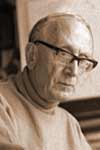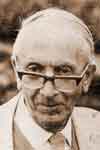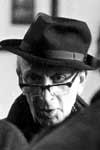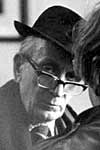|
|









back to
Essays index
|
|
Anger of a Therapist
Simon Auster,
Psychiatrist, Virginia, USA.
George Lyward was a lonely man. To be sure, like the rest of
us, much that he did perpetuated that state. But, as is true
with so many talented charismatic individuals, his admirers
mistaking the myths for the man, looked no further than the
truly inspiring surface of the teacher and therapist, and
never recognized the solitary, fearful soul within. The
tragedy of his life lies in that. Even the most ardent of
his admirers, in their thinking about education and therapy,
failed to recognize that, despite his talents, he was as
vulnerable a human being as the next man. They were prone to
set him and his work apart as freak aberrations and
irrelevant to the needs of a world populated by those less
talented than he. One of the recurrent themes of the
extended conversations that characterized our infrequent
visits was his despair over the widespread failure of
educationists to recognize that whatever his unique talent,
his work was ultimately based on a conceptual framework
developed out of experience, which although running counter
to much of the thinking in the field, could be as readily
taught.
He set a standard: There was to be no masquerading at
Finchden. As a friend who visited there once with me
expressed it, "You had better know who you are at Finchden
because you are up front all the time". While the boys had a
knack for demolishing any pretentions that a visitor (or
anyone else, I'd imagine) might attempt to foist on to them,
their model was a master at challenging his guests to be
themselves, to respond from their 'centers'. When I called
Lyward to arrange my first visit there, after the logistics
had been worked out, he put me on notice about what I might
expect, saying, "You're a psychiatrist, eh? The boys will
have fun with you." He followed this up when I first arrived
(after the boy assigned the task of taking me in to
breakfast had backed off at the last moment), by meeting me
in his bedroom as he finished dressing and asking what I
thought about the young man who had driven me over from
Ashford. Hardly a context that allowed for refuge in social
conventions or personal conceits. And yet he was no less
possessed of such conceits than any other.
To challenge the masks anyone wears, however, has never been
sufficient to persuade him to lay it down. What Lyward
recognized, and therein lies his major contribution, was
that the task of the therapist and teacher is to engage the
other in a manner such that he need no mask and to enable
the other to build on these successful engagements in such a
way that the need for masks diminishes and the person can
respond fully from his 'center'. To do this the therapist
must have the knowledge and skill to seek out and to create
situations where honest engagement is possible for the
person who has experienced human relationships as a mosaic
of masquerades, and the therapist must be open to the
manifestations of such directness when it occurs. Lyward's
exceptional talents lay in this area, in the ability to
build on a passing comment about the inadequate heat on the
train from London, a spontaneous and lively discussion
between six very troubled boys and himself on the problems
of the regulation of public utilities. Or in a different
vein, in recognition of the importance of the boys
themselves in fulfilling the therapeutic function of the
Finchden community, in having several of the more senior
boys evaluate an applicant for Finchden; their
straightforward report, given in the presence of the
applicant's parents and Probation Officer, demonstrated
clearsightedness and an understanding of the relevant
issues, a result that could only have come about from an
open and direct approach to the assignment. Lyward's
appreciation of the therapeutic potential of the community
of boys long preceded the post-War development of the
therapeutic community concept.
Friendship with Lyward was not achieved easily; his mistrust
of the approaches of others beyond the distance of
respectful admiration for his work was phenomenal. On
several occasions when we discussed the nature of friendship
he quoted to me an observation made by a colleague and
contemporary, "You turn your patients into friends and your
friends into patients." Perhaps this was intended as a
warning. More likely it was a plea. The paradox of Lyward's
life was in his success in inculcating strength and
self-trust in others, while remaining paralyzed by his own
mistrust - of himself, as well as of others. Dominated by a
fear rooted in an insecurity surviving from his childhood,
he remained unfree openly to ask of others for himself, to
respond to the dictates of his own 'center', as it were,
however arbitrary it may have seemed he could not feel
secure in such a request without the kind of rational
justification that requires a superimposed structure and
which is not to be found in the spontaneity of intimate
relationships. This resulted in a chameleon-like quality to
many of his relationships, as it impelled him to present
himself in a manner most likely to obtain the support and
approval of the person he was with, regardless of how he may
have felt at that moment. The "turning of friends into
patients", was another consequence of this insecurity,
creating a relationship that has the structure of reciprocal
obligations he so badly aneeded. Being unable to ask for
himself, he feared the requests of others, whether
explicitly or implicitly stated; he knew that he was unable
not to respond, and because of his sensitivity and
insightfulness, those who met him, even on brief
acquaintance, would often unburden themselves to him. The
'converts' were hardly unwilling victims. Aware of his need
to protect himself from being caught up in the psychological
maelstrom that an uncontrolled response to such requests
would entail, he would jokingly refer to Finchden as, "the
sheltered community I have built for myself", where his role
protected him from those outside pressures with which he was
unable to cope, yet provided him with a structure within
which he was free to engage in a manner optimally useful to
the boys, even to, "turning patients into friends."
Genuine friendship, in the spirit of shared intimacies and
open spontaneous exchange a was possible, nevertheless, if
slow in developing. As long as care was taken to refrain
from using the relationship to bootleg therapy more honestly
- and more appropriately - obtained elsewhere, as long as
there were no attempts at masquerading, the relationship
remained strong and could grow. As we spent more time
together, the inevitable misunderstandings occurred. On one
occasion these resulted in an angry shouting match which
left us both equally shaken and astonished by its intensity,
yet immensely pleased that our friendship could survive even
this. As we talked about it afterwards, he remarked, "Simon,
it is the fear of my anger that keeps Finchden going."
Lyward often spoke of the importance of anger for
demonstrating commitment and caring to boys who could
recognize no other expression of involvement and concern.
Here, however, he was referring to a different phenomenon, a
more diffuse and devastating fury that he himself
experienced as terrifying, even while recognizing it as a
significant elemental force at Finchden. Perhaps because it
was so awesome even to him, perhaps because its
effectiveness was in its remaining potential rather than
reaching expression (its importance consequently not readily
perceived), perhaps because the anger of the therapist is
still a taboo topic, and most of all, perhaps because a
close look might have hinted at an embarrassing potential
for tyrannizing the entire Finchden community, we never
fully explored the role of this energy through the fear it
provoked in those on whom it was focused, in buttressing the
behavioural limits set for the community by Lyward, the
staff and the boys.
George Lyward was an exceptional man, fully deserving the
honor and respect he received. He possessed that rare
combianation of qualities: extraordinary sensitivity and
insight, an ability to translate these gifts into effective
action, and the capacity to formulate the entire process in
a way that enabled him to teach it to those who would
listen. He was a valued friend with whom to engage, no holds
barred. And he was a lonely human being.
Simon Auster M.D.
1964-73: Director, Fairfaxx-Falls Church Mental Health
Center, Falls Church, Virginia: 1969-70: Ceramics study,
Kyoto, Japan: 1966-68: Assistant Clinical Professor of
Psychiatry, The George Washington University School of
Medicine, Washington, D.C.
|
|



















